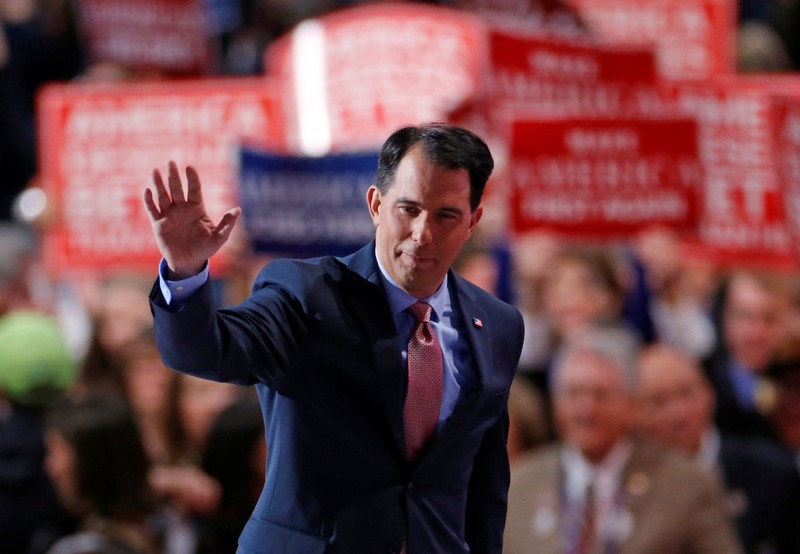
FILE PHOTO: Wisconsin Governor Scott Walker waves after speaking during the third day of the Republican National Convention in Cleveland, Ohio, U.S., July 20, 2016. REUTERS/Carlo Allegri/File Photo
August 15, 2018
By James Oliphant and Brendan O’Brien
WASHINGTON and MILWAUKEE (Reuters) – Voters chose nominees on Tuesday in the key battleground states of Wisconsin and Minnesota, setting up what are expected to be tight races as November’s congressional elections draw near.
Wisconsin Republicans tapped state senator Leah Vukmir to battle incumbent Democratic U.S. Senator Tammy Baldwin, according to an Associated Press projection, after a bruising primary that could hamper her chances in November.
That state helped drive Republican Donald Trump’s surprising presidential win two years ago and turnout there and in neighboring Minnesota could serve as a barometer of Democratic strength headed into the midterm elections.
Both states have shown signs of drifting rightward in recent years. Trump was the first Republican presidential candidate to win Wisconsin in 32 years and he narrowly lost to Democrat Hillary Clinton in Minnesota.
All 435 U.S. House members and one-third of the Senate are running for re-election in November. Democrats need to add two Senate seats to seize control of that chamber.
In the House, Democrats need to win 23 seats to take control, which would derail or stall much of Trump’s policy agenda and increase congressional oversight and investigation of the administration.
Vukmir emerged victorious after a bitter primary fight with Kevin Nicholson, a U.S. Marine Corps veteran backed by conservatives such as Senator Ted Cruz of Texas and Steve Bannon, the former Trump political adviser, in which each candidate accused the other of a lack of fealty to Trump.
“It’s now critical for our party to unify behind Leah so we can achieve our ultimate goal: defeating Tammy Baldwin,” U.S. House Speaker Paul Ryan said in a statement congratulating Vukmir.
Charlie Sykes, a longtime Republican commentator in Wisconsin, said the bruising primary could help Baldwin keep her seat, a blow to Republicans who once saw her as a top target.
“The biggest winner is Baldwin,” Sykes told Reuters. “It was an unnecessarily nasty intramural fight.”
Republicans also made their choice to replace Ryan, who is retiring from his seat in southeast Wisconsin. Bryan Steil, a former aide to Ryan, was projected to trounce Paul Nehlen, an avowed white nationalist, to be the Republican nominee.
Steil will face Randy Bryce, an ironworker known on Twitter as “Iron Stache,” in November in a suburban Milwaukee district that Democrats covet.
Wisconsin Democrats tapped Tony Evers, the state schools chief, to battle incumbent Republican Governor Scott Walker, who is seeking a third term.
Whether Walker, a former presidential candidate, can survive the challenge will be closely watched, as another measure of Democratic intensity.
“A really strong Democratic turnout in November could cause him to lose,” said Ford O’Connell, a Republican strategist in Washington. State Democrats will be motivated by their opposition to Trump in trying to bring down Walker, he said.
TRADE FACTORS
Minnesota Republicans picked state senator Karen Housley to take on Democratic incumbent U.S. Senator Tina Smith, appointed after former Senator Al Franken resigned last year amid sexual harassment accusations.
Primaries in two House districts representing regions affected by Trump’s trade policies could play a key role in determining control of Congress.
Former state representative Joe Radinovich outlasted a bevy of Democrats in an open-seat race in the state’s northeastern mining region called the Iron Range, which has seen some benefit from the administration’s steel and aluminum tariffs.
Trump has campaigned in the district for the Republican favorite, Pete Stauber.
In the state’s south, Republican Jim Hagedorn defeated Carla Nelson in a district the party hopes to seize after the Democratic incumbent, Tim Walz, ran for governor. Farmers there have complained over harm from retaliatory tariffs by China and elsewhere.
Walz won the Democratic nomination for governor, while former Minnesota Governor Tim Pawlenty lost to Republican Jeff Johnson, ending Pawlenty’s political comeback bid.
Beyond the Upper Midwest, Connecticut and Vermont also held primaries on Tuesday.
In Vermont, unofficial results showed Christine Hallquist as the first openly transgender person to win a major U.S. party nomination for statewide office in the Democratic governor’s primary.
Senator Bernie Sanders, the former presidential candidate, easily won that state’s Democratic Senate primary. But Sanders, as before, is expected to decline the nomination and run as an independent.
(Reporting by Brendan O’Brien in Milwaukee and James Oliphant in Washington; Additional reporting by David Gaffen in NEW YORK; Editing by Paul Tait and Clarence Fernandez)
